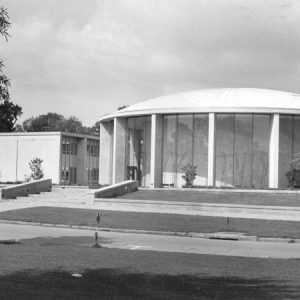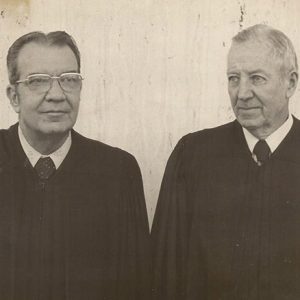calsfoundation@cals.org
City of Hot Springs v. Creviston
The Arkansas Supreme Court upended fifty-two years of financial practice by Arkansas cities and counties and numerous decisions of the Supreme Court when it ruled on March 3, 1986, that the Arkansas Constitution required the state and local governments to get voters’ approval before issuing bonds for capital improvements or any other purpose. The decision, in a case styled City of Hot Springs v. Tom Creviston, stunned local governments and financial institutions and briefly halted the issuance of financial instruments called revenue bonds, which were debts that were to be repaid from revenues generated by the project rather than from taxes. But a constitutional amendment to lift the election requirement was hastily drafted, petitions placed it on the ballot, and eight months after the decision, Arkansas voters ratified the amendment, allowing the issuance of revenue bonds to resume.
When state constitutions were written in the nineteenth century, particularly in the South, debt was viewed as dangerous and to be avoided. The national experience with railroad debt and the depression that followed the collapse of Jay Cooke & Company and the heavily bonded Northern Pacific Railway halted the rapid growth of municipal bonds. Constitutions imposed restrictions on how and for what purposes state and local governments could accumulate debt and how it could be amortized (gradually paid off with funds regularly set aside). After World War I, states began to experiment with municipal bonds again, both to improve public facilities and to stimulate industrial growth.
In Arkansas, the 1874 constitution prohibited the state, cities, or counties from issuing bonds without an election. In 1926, Arkansas voters approved Amendment 13, which authorized cities to issue bonds for a variety of projects, but only after an election, and to levy up to five mills of property tax to amortize them. None of the bond proceeds, however, could go to a railroad or any private enterprise. Two years later, however, voters approved Amendment 18, which permitted up to five mills of property taxes to amortize bonds for factories and transportation facilities, but again only after voters approved them at an election only in counties larger than a population of 105,000 (which was only Pulaski County at that time), and only under a number of other conditions. Amendment 25, approved in 1938, allowed counties to issue bonds to build courthouses, jails, and hospitals, but only after an election.
In 1936, Mississippi became the first state to issue revenue bonds for new industries. Arkansas followed in 1958 with Amendment 49, which allowed cities and counties to issue bonds for new industries and levy up to five mills of taxes. Act 9, passed by the Arkansas General Assembly in 1960, allowed cities and counties to issue bonds for industrial development and either lease the facilities to industries or loan the money to industries to build a plant.
Despite all the constitutional requirements for elections before issuing bonds, in 1934 the Supreme Court, in the case Snodgrass v. City of Pocahontas, created an exception for revenue bonds. The city of Pocahontas (Randolph County), without holding an election, passed an ordinance issuing bonds to improve the municipal waterworks. The Supreme Court opined that when the voters approved Amendment 13 in 1926, they did not intend to require an election if the bonds were to be retired not from taxes but from revenue pledged by the improvements, like the waterworks. Over the next fifty years, in more than a dozen cases, the court used that precedent to affirm the issuance of revenue bonds or to expand the exceptions to the election requirements in the state constitution.
In 1977, Chancellor Darrell Hickman, who had ruled as a trial judge that the election requirements for bonds were absolute, arrived on the Arkansas Supreme Court. He dissented in appeals of bond lawsuits. Finally, in 1981, in Purvis v. Hubbell, the Supreme Court again upheld an election exception, with Hickman dissenting, but it served notice that it might change its mind at the next instance. In Purvis, John Norman Harkey, a Batesville (Independence County) lawyer representing an old Marine buddy, Marshall W. Purvis, sought to invalidate a $27.4 million bond issued by the City of Little Rock (Pulaski County) to build the downtown convention center because there had been no election. The Supreme Court said its precedents validated the financial arrangement but signaled that it would take a fresh look at the issue at the next case. In a sharp dissent, Hickman observed that the chambers where the justices sat were built by bonds that were unconstitutionally issued because there was no election.
The next case, also brought by Purvis, who was again represented by Harkey (he also was the suing attorney in City of Hot Springs v. Creviston), challenged Little Rock’s issuance of $4 million in “tourism bonds” to build La Quinta Inn at Van Buren Street and Interstate 630 in Little Rock. In Purvis v. Little Rock (called by the Supreme Court Purvis II), the court was so badly splintered that it could render no majority decision. Five of the seven justices wrote opinions.
Harkey found the perfect case for the final challenge of the election exceptions. Garland County had issued $4 million in bonds in 1978 to help build the Magic Springs theme park at Hot Springs. The bonds were to be repaid by theme park receipts. But the park lost money from the outset, and the City of Hot Springs then issued another $3 million in bonds, which were used mainly to repay the theme park’s debts to two banks. Harkey sued, contending that bailing out the banks was not a legitimate public purpose and that the bonds should have been approved first by the voters. The chancellor and the Supreme Court agreed on both points.
The Supreme Court opinion, written by Associate Justice George Rose Smith, who had gone along with all the precedents in his previous thirty-seven years on the court, said the justices were clearly wrong when they created the first exception in 1934. “The Snodgrass opinion did not explain why it was manifest that the framers of Amendment 13 did not really mean what they said,” he wrote. He lamented all the decisions that followed that also implied that the authors of the constitution did not mean what they said. “We believe that the only proper and permanent course is for us simply to give effect to the plain language of the Constitution,” Smith said. “It states that no city or county shall ever have interest-bearing evidences of indebtedness without the consent of electors. That mandate is binding.”
Two justices, Steele Hays and Robert H. Dudley, dissented. They said the exceptions created by Snodgrass and the other decisions were reasonable and should not be reversed after the court had given them its blessing over so many years.
The decision caused momentary panic. Governor Bill Clinton spurred a drive to get a constitutional amendment written and petitions circulated before the deadline, which was only three months away. The petitions were approved, and the voters ratified the amendment at the general election, 318,894 to 275,877. Amendment 65 says that any governmental unit in Arkansas may issue revenue bonds for public facilities, industry, or agriculture under conditions set by the General Assembly. The amendment says the legislature can choose to require an election. As of 2016, it has not.
For additional information:
City of Hot Springs v. Tom Creviston (1986), 705 S.W. 2nd 415, 288 Ark. 286.
M. B. Purvis v. City of Little Rock [Purvis II], 667 S.W. 2d 936 (1984) 282 Ark. 182.
M. B. Purvis v. Webster Hubbell, Mayor [Purvis I], 620 S.W. 2d 282 (1981), 273 Arkansas 330.
“Ruling on Bonds ‘Blow to State’ Governor Says.” Arkansas Gazette, March 5, 1986, pp. 1A, 9A.
Snodgrass v. Pocahontas, 75 S.W. 2d 223 (1934) 189 Ark. 819.
Wells, Bob. “All Municipal, County Bond Issues Need Voter Approval, Justices Rule.” Arkansas Gazette, March 4, 1986, pp. 1A, 5A.
———. “Decision on Bonds May Go to Voters.” Arkansas Gazette, March 6, 1986, pp. 1A, 12A.
Ernest Dumas
Little Rock, Arkansas
 Divergent Prosperity and the Arc of Reform, 1968–2022
Divergent Prosperity and the Arc of Reform, 1968–2022 Law
Law Politics and Government
Politics and Government Arkansas Supreme Court
Arkansas Supreme Court  Supreme Court Justices
Supreme Court Justices 



Comments
No comments on this entry yet.